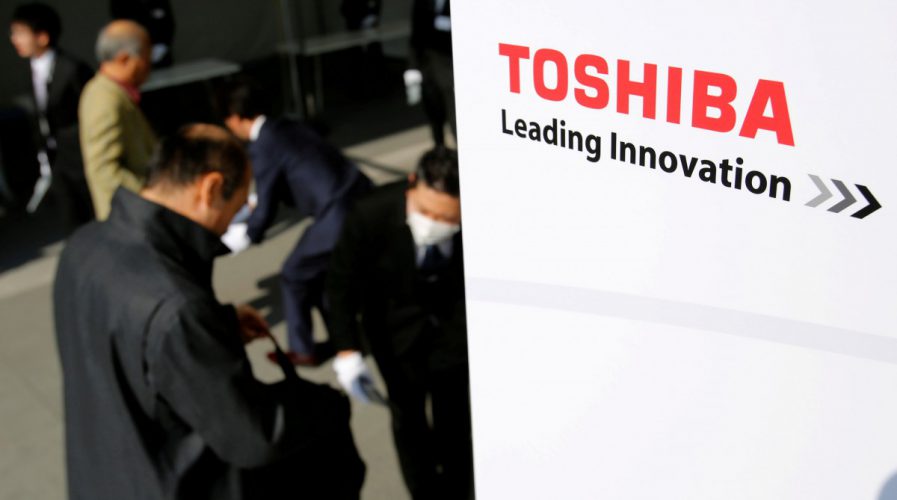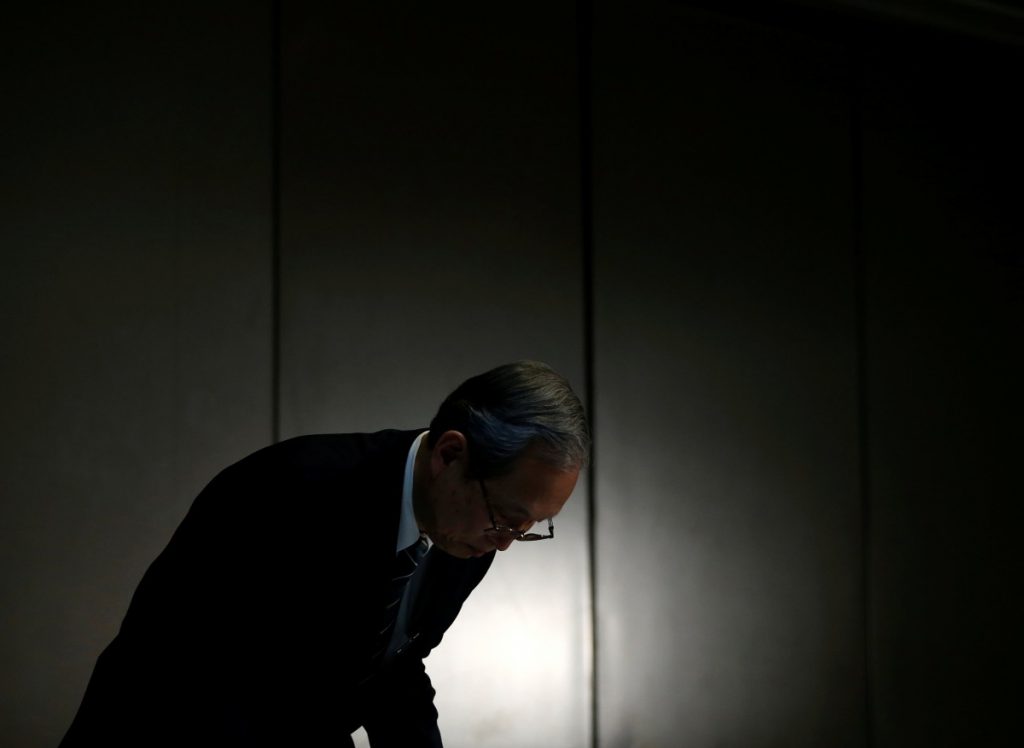
Shareholders arrive at Toshiba’s extraordinary shareholders meeting in Chiba, Japan. Source: Reuters
Never-ending misfortunes: Toshiba stuck in the news cycle from hell
EMBATTLED Toshiba has had a rather terrible week following previously reported news the Japanese government would not be extending a helping hand to save them from falling share prices and bankrupting nuclear power businesses.
Since the news spread that Toshiba’s Westinghouse nuclear business was probably bankrupt, the company has since seen their share price fall 23 percent and investors panic over a crisis where the end is nowhere in sight.
Since revelations of Westinghouse’s bankruptcy erupted into the public consciousness and solidified, Toshiba has not been able to move on from firefighting. Odds are that the fallout will ripple out for years to come.
Here is a brief rundown of exactly what is happening at Toshiba.
Westinghouse officially declares bankruptcy
The Pittsburgh-based nuclear company officially filed for Chapter 11 bankruptcy on Wednesday, March 29, confirming what many already believed was imminent.
The following day, the company was cleared by a US bankruptcy judge from the Southern District of New York to borrow an initial US$350 million to support its global operations while undergoing a restructuring exercise. The loan would also support the company’s profitable nuclear maintenance and fuel Europe businesses largely unaffected by the bankruptcy claim.
Westinghouse's bankruptcy raises questions about the fate of four half-finished nuclear reactors in the U.S.https://t.co/bB42ueBvSW
— Wall Street Journal (@WSJ) March 29, 2017
The news arrived amidst widespread speculation Toshiba was wading in deep red waters because of cost overruns at a four-way nuclear power plant project being built in the southeast corner of the US.
Westinghouse was commissioned by SCANA Corp. and Vogtle (owned by Southern Co.) to build plants scheduled to start producing power as soon as this week, but those plans have been thrown way off course by the Chapter 11.
Currently, Westinghouse is battling to stay afloat long enough to complete the projects – the deals represent the first US nuclear projects to be approved since the 1979 Three Mile Island accident. According to the company, the serious cost overruns are due to the increasing demands from regulators, and the rising cost of raw materials and labor.
Costs escalate for SCANA and Southern
Toshiba bought Westinghouse in 2005 for a staggering US$5.4 billion dollars, an acquisition that had the effect of upsetting the company’s finances. Of course, the company’s woes worsened with the onset of the financial crisis. But previously, Westinghouse appeared to be the company’s
Of course, the company’s woes worsened with the onset of the financial crisis. But previously, Westinghouse appeared to be the company’s savior – it was the first step to helping Toshiba diversify from consumer electronics, a market it was already losing to China’s growing juggernaut.
To be fair to Toshiba, the Westinghouse acquisition seemed like a great idea at the time – the company has a strong legacy as player in the atomic industry, as they supplied the world’s first pressurized water reactor in 1957. Toshiba was banking on the nuclear industry to stay relevant – until Fukushima happened and the world started turning away from nuclear power.
SEE ALSO: Toshiba loses billions of dollars and its chairman over nuclear power business
The catastrophe that occurred on the west coast of Japan’s main island prompted stricter safety regulations which have driven up the costs and instilled wariness in foreign countries about implementing nuclear power policies.
SCANA and Southern have been adamant they want the project to continue no matter what, with the head of Southern notably flying to Tokyo to “look the CEO of Toshiba in the eye” to ensure he remembers the “moral commitment” Westinghouse had made to supply nuclear power to the people of South Carolina.
“We’re facing a stark choice – shut down because (Westinghouse) no longer wants to provide support, or step in and take on direct payment of workers and vendors,” Greg Gordon, a lawyer for Southern Co’s Georgia utility told the court on Thursday.
However, SCANA and Southern will probably have to fork out billions more in additional cost, Morgan Stanley noted. They could potentially face a collective US$8.5 billion bill, a burden which would inevitably drag down their share prices and compromise investor confidence.
Westinghouse said in a statement they had obtained US$800 million in debtor-in-possession financing as part of their reorganization exercise, and would not cease operations on current projects during an initial assessment period. The funds were provided by an affiliate of Apollo Global Management.
Westinghouse’s failure comes at a time when Toshiba was only just beginning to emerge from a two-year long profits padding scandal. The company’s reputation had taken a serious beating amongst investors since the news broke in September 2015, and in 2016 share prices were beginning to recover, rising by 13 percent.
Of course, all that changed when Westinghouse’s financial problems hit the proverbial fan, and the company found itself in a news cycle from hell.

Toshiba’s memory chip business goes to highest bidder
So how do you save a sinking ship? Toshiba is putting up their beloved NAN memory chip business up for sale, in a bid to save itself from totally going under. The company’s shareholders grudgingly approved the sale of the memory chip business, but not before going postal on the management team.
Less than 24 hours after the bankruptcy filing, 1,300 shareholders gathered together to be briefed regarding the company’s plans and asked to take a vote. Some were reportedly in tears as the group collectively denounced the actions of the company. Chief executive Satoshi Tsunakawa repeatedly offered apologies, but his answers on why the company decided to expand its nuclear-power business even after the 2011 meltdown at the Fukushima Daiichi plant in Japan were vague at best.
An elderly shareholder was shaken enough that he shouted “Shame on you!” at the management executives. “You are all liars. How could you ask us to trust management?”
Another angrily said, “I think all of you are incompetent as managers. Do you even know what’s happening?” and yet another called the executives “trash.”
didn't realise that toshiba investors are largely tumblr users pic.twitter.com/o4jQbynIYh
— j.r. hennessy (@jrhennessy) March 30, 2017
Toshiba is hoping to make a profit of at least JP¥1 trillion, and are expecting the chip business to kick in at a valuation of about JP¥2 trillion. The profit could cover the gaping wound left behind by the Westinghouse bankruptcy by all accounts. So far, 10 potential bidders have expressed interest, while two US companies – private equity firm Silver Lake Partners and chipmaker Broadcom Ltd – have offered a JP¥2 trillion package, as reported by Nikkei.
SEE ALSO: Toshiba to consider spin-off of chip-making business stake to Western Digital
Other interested parties include Western Digital Corp., Micron Technology Inc., and the SK Hynix-led consortium that reportedly put down an offer of US$9 billion for a majority stake.
The company said they would announce the successful bidder before the next shareholders meeting in June.
Can they save themselves?
It’s not a problem the Japanese government can ignore – Toshiba, alongside another conglomerate Hitachi, is the “pillar” of the Japanese economy and supplies 200,000 jobs in Japan. Should the company fail, it could cause a rupture in the business world that would compromise Japan’s sluggish economic revival, and perhaps even the US economy, in which it has significant investments.
“This is one of Japan’s historic corporations and it’s very important to the Japanese economy, so this could be very significant for Japan,” said Tom O’Sullivan, a Tokyo-based energy analyst, as quoted by The Washington Post.
That said, the government has been clear it will steer clear of the problem. Japan’s economy, trade and industry minister Hiroshige Seko said, “The issues related to Toshiba are for the managers of individual companies to discuss.” Evidently, Southern’s appeal for government intervention is falling on deaf ears.
Some commentators have noted Toshiba’s problems do not exist in vacuum, but is symptomatic of a greater Japanese corporate culture that prizes reputation above substance – the very sense that led to the company’s accounting scandal two years ago and the vaguely explained actions of the company.
“What they’re doing actually hurts the company’s credibility. But they think they are acting for the sake of the company,” adds a former Toshiba official.
The road to recovery for Toshiba is uncertain, as it’s unclear if the sale of the company’s chip business can even save it. The value of the company has been sliced in half since last October and their prospects are pretty gloomy. Should the cloak-and-dagger secrecy continue, Toshiba might find itself on a sinking ship with no help in sight.
(Additional reporting by Reuters)
READ MORE
- Ethical AI: The renewed importance of safeguarding data and customer privacy in Generative AI applications
- How Japan balances AI-driven opportunities with cybersecurity needs
- Deploying SASE: Benchmarking your approach
- Insurance everywhere all at once: the digital transformation of the APAC insurance industry
- Google parent Alphabet eyes HubSpot: A potential acquisition shaping the future of CRM
